Get posts by email
In response to the times
April 7, 2022
Listen to an audio version of this blog essay for free.
A friend of mine who knows a thing or two about preparing for emergencies and unexpected events has a saying.
Prepare for what you’ve already been through, plus a bit more.
This friend of mine teaches everyday preparedness and homemaking lifeskills like having enough food in your cupboards for emergencies, an unexpected job loss or an adverse weather event. Her teachings, based on how she actually lives, have started to go beyond “have a 4 week food stash” and into more long term preparedness, crisis, and post-crisis living.
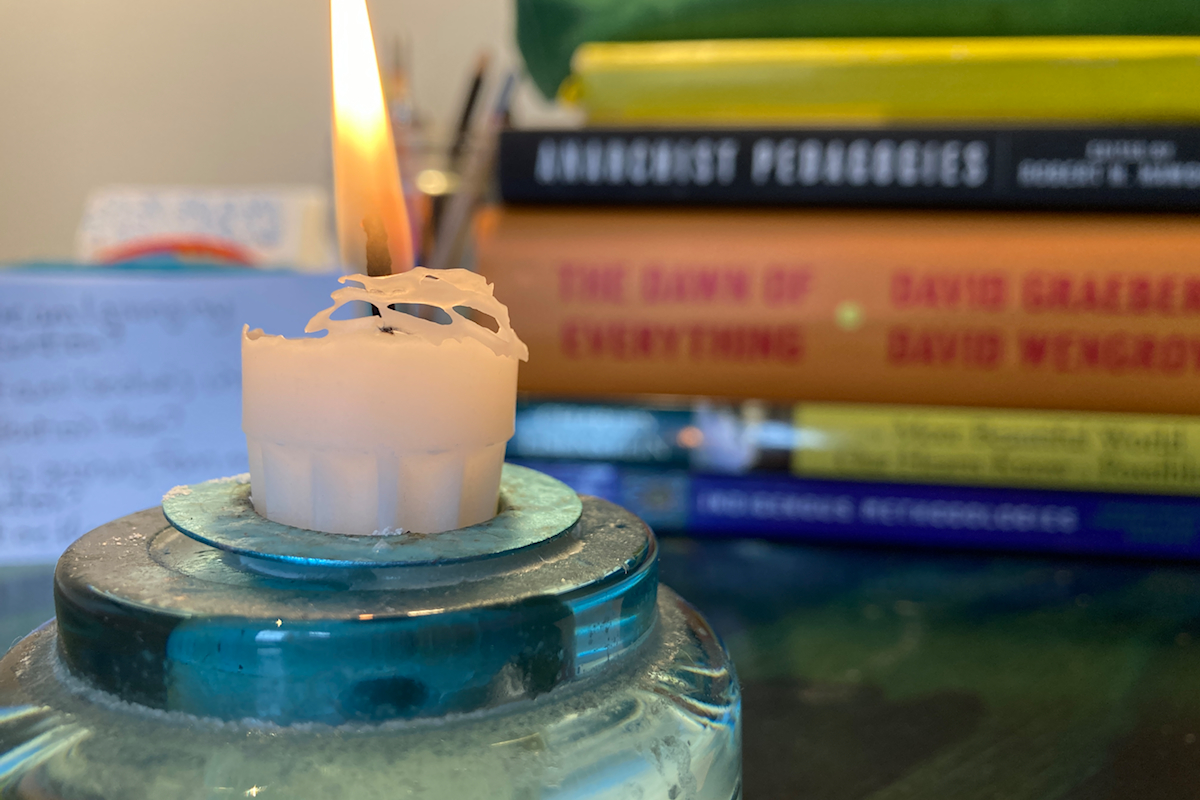
You may be familiar with her memberships site and blog. Heather and I go back about 15 years and I’ve been so privileged to work with her, including the past year and a half as her technical support for her membership site.
But this post isn’t about Heather, though I am happy to talk about her and her work. You can’t find better quality than what she does, which is just one of the reasons I love working with her!
My point in mentioning Heather’s work is because I feel her advice is sound and it has been ringing in my ears now for many months. And it’s time to talk about the conclusions I’ve been drawing from my life experience and “the state of the world”, as filtered through the lens of this sound advice.
Prepare for what you’ve already been through, plus a bit more.
Maybe I should have worked in insurance
Something you have to know about me, if you don’t already, is that my natural inclination is to be always scanning the horizon for potential danger. Maybe all of us do this at an atavistic level. I am security and safety driven. I am on the lookout for things that will threaten me and my loved ones. I am trying to anticipate those things and do whatever I can, within the parameters of my values and ethics, to ameliorate or prevent loss.
I had a super-secure childhood in which I felt minimal threat to my well-being and security. Growing up, my dad was a small business owner with responsibilities to clients and employees and I recall the stress and financial losses he weathered. There were also bouts of serious and scary illness, at least one of which could have been fatal. But none of these things threatened my overall sense of stability because I was confident the adults could manage whatever came up. And I had a magical faith in which Jesus would not actually let anything truly bad happen to me. I went through childhood this way, bubbled and protected.
I had an incredibly strong family network layered on a comfortable and secure middle class background. Nowadays, we call this privilege. For me, growing up in Central Alberta in a relatively prosperous small town in the 80’s, the word for it was “normal”. (Which really is the mark of your good fortune, not knowing how fortunate you really are.)
As a young adult I sought a protected and safe life in marriage. And to a large degree, it’s worked. The whole point of building families is to create the structures and network to weather the storms and difficulties of life.
Along the way, I lost my magical faith as well as the idea that making “good choices” would protect me from loss. Sound decision making has obvious benefits but it’s not a fail-safe. My Christian faith shifted from “God will make all things well for us and whisk us out of here in end, regardless” into “God is with us and in us through all things”.
Adulthood has been a journey of coming to terms with what life is, filtered of course through a particular worldview and belief system (which evolves), and figuring out how to live in response to those perceptions and experiences.
The world we envision on the horizon today is not the world I was envisioning as a young adult. I think others were seeing it, were tuning into it two decades ago, but I was very insulated in both worldview and lived experience.
As my children have come into their own adulthood I can’t help but compare their experience and awareness to my own at their age, and I have grieved the social, economic, political, and environmental changes (to name a few) to our world that make this a challenging time to be a young person. The burdens my children carry, worries and realities I did not face, as they enter adulthood are a source of grief for me; and a motivator for action.
And then there was a pandemic
In the past two years the possibilities of all that could go wrong in the world, in our country, in our communities, was heaped on top of the existing economic, social, political and environmental realities of the early 21st century.
This is not an all is lost story or everything’s going to hell in a handbasket, though somedays I feel that way. Nor does stating all this negate the opportunities that exist now that never did before. But I have become suspect of progressivism in recent years. The idea that science, technology, enlightened ideas, progressive leaders, and globalization will save us. This wariness increased exponentially in 2021 and early 2022 as a result of two unrelated things. Course content in my graduate studies. And watching an already tenuous social cohesion in Canadian society further unravel, fuelled by our own government handling and media response to the Covid-19 pandemic.
This is a “dis”illusionment story. Where previous illusions (which we actually call disillusions) are shattered. One of many in my life. And I’ve readily acknowledged in previous posts that the fact it took me so long to get here speaks to my extreme fortune.
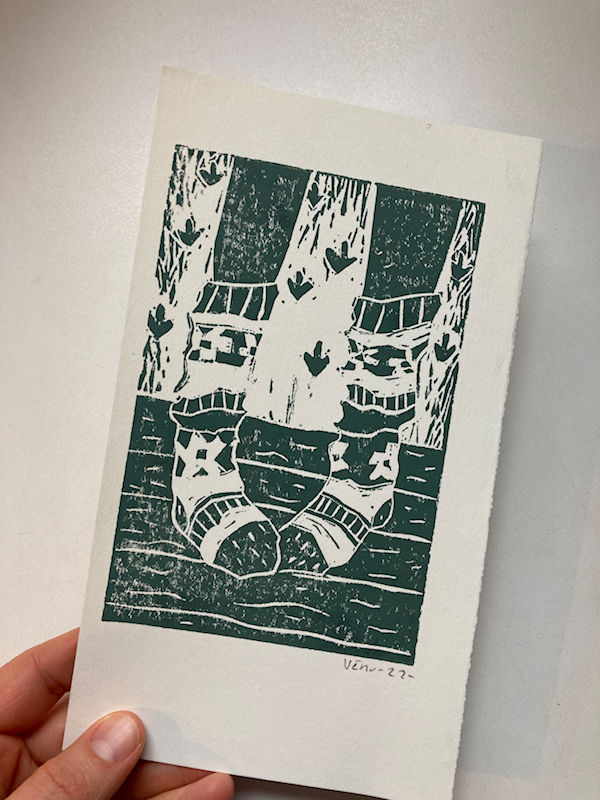
art in the mail from an Instagram account I follow
I find these things difficult to write about because I know that people experience life differently and will draw individual conclusions, which I respect. And my own perspective may feel very foreign to you and I’m not sure how to bridge that gap.
We never know exactly how other people experience reality. For my part, I’m trying to lay out, as clearly as I can, my positionality (where I come from, how I see the world) to explain the pathways I’m choosing, based on my personality, life goals and dreams, past and present experiences.
Prepare for what you’ve already been through, plus a bit more has taken on a whole new dimension in recent years and recent months.
A few years ago when we were still trying to figure out where to land after our current and still on-going season in Montreal, I prepared a spreadsheet to plot some of our future possibilities. The dreams themselves might get written in a journal, notebook, an index card, or even in a blog post, but plotting out how do that financially requires spreadsheets (for me at least).
Anyway, I came across this spreadsheet recently, I knew it existed somewhere in my files and I wanted to update the timeline with new data, notably our decision from last year to move to Nova Scotia.
On that sheet, which was started with no clear vision of where we would live after raising our children, there was a note in one of the cells. “Should we be considering climate change in choosing where to live?” There was no answer in any accompanying cell.
We’ve migrated quite a few times in our married lives, have uprooted and moved across the continent, have sought adventures and experiences, but never have we considered climate change in choosing where to live.
Our decision to move to Nova Scotia is not motivated by climate change, per se. It’s motivated by the desire to secure the well-being of our family, across all current living generations, by creating multi-generational housing on a family property. Which we belief will help us “weather” climate change and other uncertainties and possibilities of the future.
This is just one example of how “prepare for what you’ve already been through, plus a bit more” is influencing my decision making.
What do we see happening in the world around us and how do we respond to that?
Trusting the system (religious & societal) and the implications of that in my life
Overall I have lived with a very high degree of trust in systems and government for providing the structure and framework for a well-functioning society. On the other hand I was not willing to trust this same government with educating my children. So my trust is selective, it would appear.
Part of this trust is because of my Canadian context. I live in a liberal democracy (despite some evidence to the contrary this winter); a country with socialized medicine, progressive policies, and a basic social security net. Sure there might be problems on the horizon, but you know, other people who are well paid to solve these problems were taking care of it.
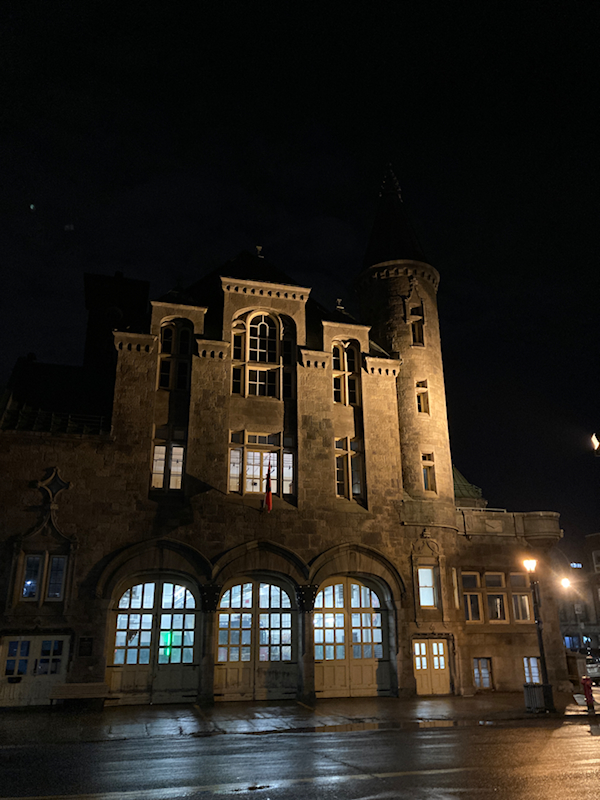
My trust in a well-functioning society and systems, my trust in the promises of globalization and progressivism, were part of what enabled the expression of the wanderlust part of my identity.
I’ve had four major moves in adulthood. I’ve moved internationally, crossed the continent, taken risks in new cultural and linguistic regions. Every place we’ve landed we’ve done so without extended family or prior connections to that locale. As a security-driven person the only reason I felt ok uprooting this way, and multiple times, was because I could place my trust in a few things.
First, I trusted in my marriage and that Damien and I could get through anything together, which has held true. I trusted that the overall system was more or less the same in each new location and could be relied upon. And I trusted in a particular religious view that allowed me to find security, both physical and metaphysical, in spite of uprooting, wandering, and exploring.
I am a family-oriented person. I believe in the institution of the family. For me, in the time, place, and culture I was born into, I believe family is the most fundamental, reliable, true locus of care within society. I’m not defining family in nuclear or heteronormative terms, though my own family creation has been along those lines. I’m defining family as the people we come from, those that come from us, and those we commit ourselves to at the deepest level of sacrifice and attachment. Our kin.
My own experience as a child, a wife, a mother; and my hopes to be a caregiver, should I be so lucky, for my one-day elderly parents, has not disabused me of this belief or notion. These life experiences have only strengthened my philosophy.
I realize this is not everyone’s reality or truth. But it is mine.
As a young adult I enthusiastically moved away from kith and kin because of a very secure attachment that I knew wouldn’t be broken by distance and because I believed in a literal heaven reunion of family after death. And as it happened my whole family was Christian also, so no problem, no worries. We’d spend a few years on earth separated but have eternity together. Additionally, as a Christian in North America I knew I could find religious community and belonging in almost any location. Security was in finding the “right” church.
These provisions of my faith, ready community and a belief in an afterlife reunion, as well as trusting the general systems of Canadian and American society were primary sources of external security for me.
I’m pretty sure some people’s wanderlust does not require an external security back-up, or requires less than what I need. They might just seek less security to begin with or they have a strong internal sense of “I’ve got what I need to face new challenges”. My husband is that type of person.
I am oriented towards external sources of security; other people, expert wisdom and knowledge, trusted authorities. By nurture or nature or some of both, this is how I’m wired. But thankfully I have a strong questioning and rebellious streak which can hack into and counteract the potential damage from my external-oriented security system. It’s saved me, numerous times.
It is the inner work of my life to find a path of wholeness and health in response to, and accounting for both these impulses. That’s my primary inner work, and I’m certain you have your own.
In whom do we trust?
I’ve had multiple experiences throughout adulthood of realising I sought security in the wrong places or ideas, as I’ve attempted to find footing in untrustworthy ideologies, people, and/or systems. Those realizations have been humbling but they have also been my teachers.
After losing faith in the religious story of my youth that God will whisk only the saved out of here in death to our true home in Heaven, when all will be made right, I’ve been inclined to put some faith in “progressive” policy as a possible solution to the human condition.
God’s not saving us from ourselves, and all the damage we’ve wrought, but maybe good policy can.
Many of the non-religious or non-spiritual believers of western culture have been hanging out here for a long time.
This newest trust has started to crumble for me. It never held the same solidity in my life as my religious upbringing because I still believe in the human capacity for both great good and great evil. For that matter, I still believe in actual “good” and actual “evil”, not simply as ideas that are socially constructed or relative to culture. And not even the best policy possible can eliminate our evil inclinations.
My faith in good policy as a solution or as a wall of security has been crumbling slowly for a few years now but during the pandemic and especially the last 8 months, huge chunks of masonry are failing down.
My hope that we were moving en masse in political and maybe economic directions for human flourishing is eroding. I think some progress has been made socially, in terms of human rights, especially for marginalized groups and individuals, for example, LGBTQ+ folx. However, the toxicity of the polarization in western culture right now makes me question how far we’ve really come.
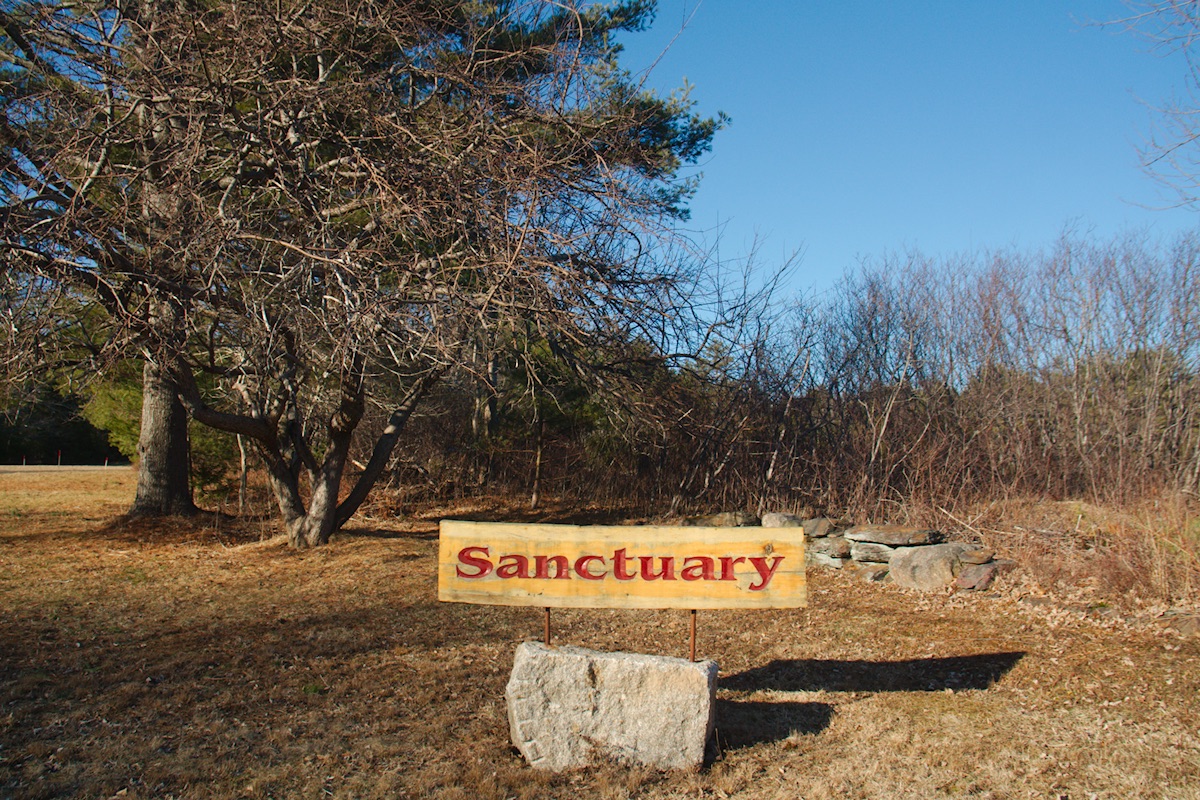
The mud slinging, scapegoating, cancelling, and demonizing that both, and all sides, are willing to do to each other, has simply convinced me of my aforementioned belief of the capacity for evil inside us all. A capacity, whose expression is probably diminished with certain systemic changes and “good starts in life” and all the rest, but a capacity that will not be magically disappearing from the human condition anytime soon, regardless of what history we’re teaching in schools.
Many people, both individually and in groups, have been coming up against this evil in their lived experience for many years. They have been oppressed and exploited, and there is an increased emphasis in broader culture these days (and especially the circles I hang out in) to right those wrongs. And I’m seeking my own answers for how I can contribute to that. That’s part of the reason I’m in grad school, to figure out what my role could be in that as related to education and family policy.
But while I see some positive changes and necessary awareness raising I am also observing a collective crumbling. I’m not educated enough to name and analyze all the things contributing to this but here are a few (and they are interrelated): the cumulative and compounding effects of decades of globalization and neoliberal policies around the globe; increased political polarization; the damage we’ve done to Earth, climate change, and its specter of doom; and the loss of shared societal narrative and social cohesion (especially in the west).
A lot of that cohesion was around shit ideas (eg: inherent superiority of some people over others). I’m not saying the societal solidarity was good or inclusive, but the loss of shared story leaves a hole to be filled. And in my opinion, it’s been filled with a different shit story (eg: finding meaning in the material).
I believe there are origin stories and cultural narratives underlying all of this that have steered us towards this crumbling. And although I disagree with the presuppositions (separation, scarcity, profiting from Mother Earth, unlimited growth, etc.) and the cultural spinoffs from those, my own experience of navigating a life based on an evolving narrative makes me realize just how vulnerable we are as humans to error. I see my own errors all over the place. Errors I can’t just blame on the system I find myself operating in. And so I recognize and acknowledge how cultural narratives can skew in dangerous directions, especially when they gain power to influence a large group of people.
An exploitative narrative believed and practiced by 10 people is a drop in the bucket of impact compared to an exploitative narrative believed and practiced by 10 million people, for example.
But we can change. We can change as individuals and collectively. Though we have to be honest that we can’t change any irreparable damage and the ecological, social and political repercussions from that damage. To think there are no consequences is beyond hubris.
A directional shift
We’ve been ingrained in our rational, expert-revering culture to assume that the decision-making about our lives is above our pay grade. We’re really not fit to govern ourselves. The world’s too big, too complicated, and all that.
It is big. And how each of us move through a world that feels so big and complicated is unique to our own circumstance. As I think about my future, specifically around work and family, I have to consider those who have been entrusted to my care. The goal, professionally and personally, is to enlarge the circle of care, and to work at connecting these circles of care so that no one is “outside” a circle of belonging and security.
This is my vision for work and life.
I believe that communities of care flourish where individuals flourish. I laid this out in My Line in the Sand:
A good society supports the conditions of people’s individual flourishing by both expecting, and providing tools for, individuals to maximally contribute to the common good. The common good is dependant upon individual flourishing and the nurturing and support of people’s natural desire for connection and capacity to care.
The big bureaucratic processes that run our lives are not oriented this way. And the unfolding of the pandemic in Canada was a big wake up call to this.
Prepare for what you’ve already been through, plus a bit more.
Who are my people? How do I care for them? How do I receive the care I need? Where and how do I enlarge the circle? Where can I practice my own autonomy, responsibility, and relationality for the flourishing of self and the collective? Where will I help others flourish by supporting their autonomy, responsibility, and relationality?
The tug, the response to the world at present, to the lessons of history and to the indicators of where this juggernaut might be headed, is to root myself real deep in a physical community, a specific place in time and space.
A place where it’s your connections with people and land that might help mitigate the uncertainty of life, not your dependancy on a system that at best, truly doesn’t know or care about you in specific, and at worst, wants to exploit and minimize you for the gain of those in power.
Is this a fail-safe? Hell no! Just ask the Indigenous people who were dispossessed from the land in order for my ancestors to settle here. And remain dispossessed of their ancestral lands in the lingering affects of colonization.
So no, it’s not “the” answer. But it’s an answer. And we need many answers. Many voices. Many experiments.
Commitment to place has not been a primary guiding force in my life. Relationships matter deeply to me and they are the most important thing in my life but my “sense” of community has been more expansive than place. This sense was both a response to, and a catalyst for, adventurous and individualistic, freedom-orientated lifestyle choices. Choices made out of interests, desire, need, and personalities of two partners trying to build a life together. Choices that were both possible and vaunted in a modern and globalized culture.
Rooted to my husband and children and in strong relationship with (if not physically connected to) my parents, I wandered and experienced life. And I have grown beyond the bounds of what I ever thought was possible. I have become who I’ve become. For better or worse. I do hope better.
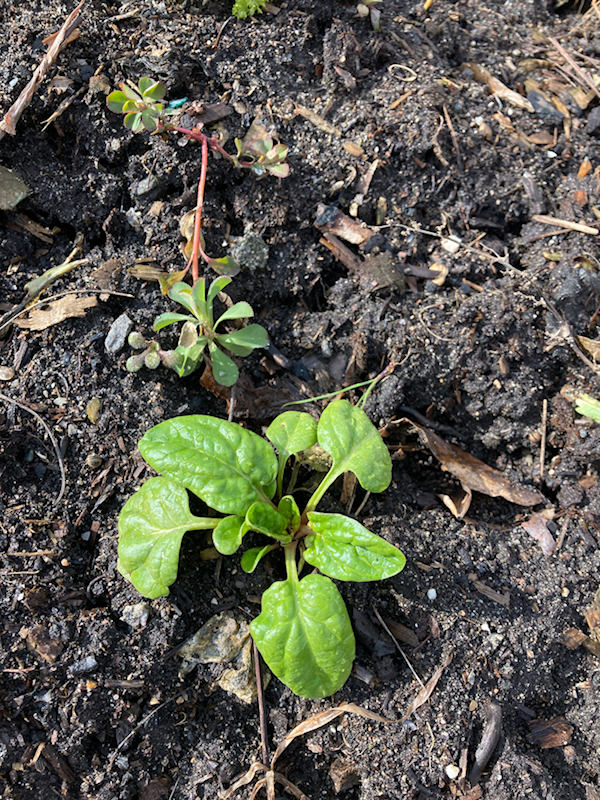
And what I’ve become now is a person who sees community in place as the foundational piece of what I need to weather the future. And what I need to weather the present. Place as a type of security may be the most primal security orientation there is.
As much as I’d love to say “let’s build a big system to take care of us all” because I want everyone to be taken care, that is not where my compass is pointing me.
Care for all? Yes. Trusting that a big system will achieve that? Nope. Not anymore.
On this account I would LOVE to be proven wrong, but while I wait that out, I’m going to be working in the direction my internal compass is pointing, smaller scale and more personally connected.
Pax Romana
If institutions once had “care” at the forefront of their missions, few of the large ones do any longer. Corporatization, privatization, globalization - all the “-izations” have corrupted the care. The promise was that bigger was better, or maybe corporate was better. Whatever was driving it, making it larger was going to make it better.
I’m not enough of a historian to know what the promise was but I can look at the outcomes.
Let’s evaluate just one outcome. If care and collective good were primary motivating principles of the rising technocractic and corporate institutionalism and bureaucratization of our lives for the past decades then we should have seen the inequality gap decrease. But that has not happened.
At the same time that we have put more power and trust in institutions and delegated democracies, where the most powerful players are far removed from the people they should be serving and representing, inequality has continued to rise. I’m not saying this is causation, what I am saying is that the idea that I can trust in some established system of “elite players” to fix an issue, let’s say, climate change, while these same players and system have been incapable of fixing something like inequality of life opportunity, is a belief that is exiting stage left in my life. (You can read all you want into stage “left”.)
Earlier in my spiritual journey I would have said “of course we can’t trust the government/systems/bureaucracy we can only trust God!” But then I lost the faith in God as an escape plan or rescue mission off of Earth.
I still have a belief in God but not as salvation from Earth.
Earth is my home. It’s my birthright. I’m from here. I’m from the dust of this earth, metaphorically in the biblical story of creation and literally in that my being is composed of the same physical elements as the Earth. Our food comes from soil and that food becomes our cells. I am of Earth. I will become Earth. Those ideas are as much a part of my spirituality now as is my belief in the Divine, which I experience as the animating spirit, purpose, and heartbeat of all of this.
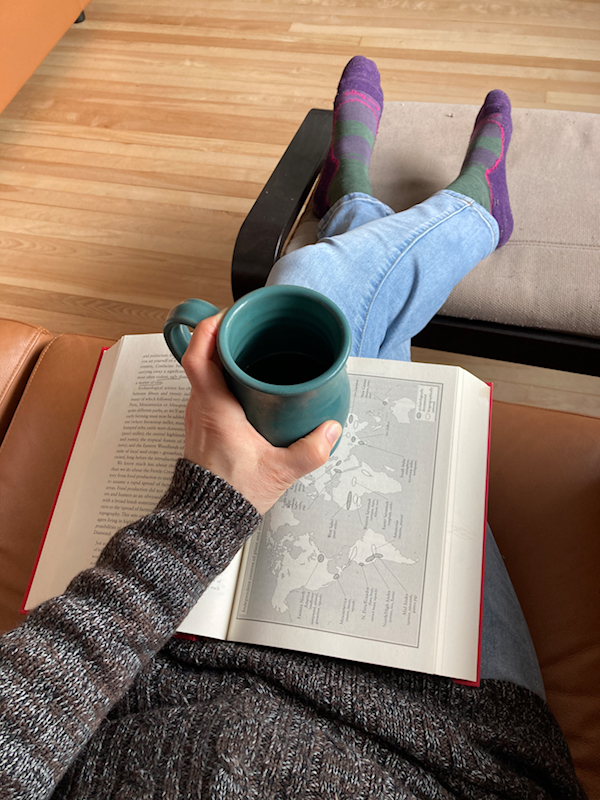
One of the gifts of a Christian religious upbringing is a familiarity with the Roman Empire. The fundamental story of Christianity is an opposition to Empire, an opposition to the consumption and exploitation of other humans for personal and political advancement and gain.
I feel a waning Empire breathing hot and hard down my neck. Grasping for peace through power. Peace through silencing those we disagree with. Peace through sacrificing personal agency for security and protection. Peace through division. Peace through technology. Peace through profit. Peace through hegemony.
Pax Romana.
Where do we go from here?
As a person who doesn’t believe in separate-ness from God or each other, I can’t practice a type of Christianity based in otherness and separate-ness, from God or each other.
I can’t coalesce and find group solidarity and cohesion around a set of doctrines that promote otherness. The loss of solidarity is a real loss. A loss that I have been mourning for a couple years now.
And in that loss, I have been looking for where I might find an alternative solidarity and belonging. Maybe in political leanings, causes, or perspectives?
But again, as a person who doesn’t believe in separate-ness from God or each other, I can’t participate in politics (which is to say, a vision for society) based in otherness and separate-ness. I can’t abide by calls of such causes, any causes, to “other” one another. To strip people of their humanity, their inherent dignity, worth and value, for ideological or practical gains.
This winter as I have been evaluating, again, all that has been happening to the ecological environment, to western culture, in global economics and politics, I have asked myself, again, where will I find solidarity, cohesion, security?
My answer is that I find these things in the people I know and call my own, in a place and a piece of Earth we call home. In kith and kin. Place and people. People and place. I want to build these “things”.
Solidarity, cohesion, and security may remain elusive on large scales but at smaller scales, maybe some can be found.
Having revealed my external-security seeking tendencies I recognize my own vulnerability to false causes and premises. Is this just another one of those? Maybe.
What can I trust? Who can I trust?
At some point I have to trust my own intuition, my internal compass, my personal experience. I have to look at who and what has proven most trustworthy in my life. I have to answer the tug of where my life vision and purpose is leading me. And where it’s leading me is to people and place.
Having raised my kids and upon seeing them through their post-secondary education, I will return to the people I came from and build a deliberate and intentional life with them. Specifically, my parents. We will create a community together on a small piece of land that will one day welcome and provide for the children, should they ever need or choose. A community that will care for each other through all the knowns (old age) and unknowns (affects of climate change, economic upheaval etc.) that lie ahead.
This is my response as I study the effects of globalization on our world.
This is my response to my observations that our culture has traded a sacred story and connection for commerce, science, and technology and we’re bereft of meaning because of it.
This is my response as I try to figure out what and how I’ll have a career at this stage of my life. It is clear to me now that career will remain subject-to my primary callings, roles, and responsibilities of care for family and community. Ideally career will allow me to spread a philosophy of family-community ethics of care, and to extend and overlap circles of care with others.
This is my response having lived through a pandemic in a city, under a government inclined to authoritarian measures and an instrumentalist approach to crisis management, ie: to use whatever means necessary to coerce behavior, even if it contributes to shredding social connection and civility.
This is my response, as a parent, to the uncertainty that my young adult children face in their future.
This is how I prepare for what I’ve already been through, plus a bit more.
What does the future hold? Who knows! But history, present experience and science fiction (I’m not joking) give some clues to the possibilities that await us.
I’m pointing myself in the direction where I feel I’ll have the resources, connections, and tools to face what comes, to care for those in my circle, to extend and overlap the circles.
As a memorist writer pursuing a master’s degree and having to heavily, and understandably, cite sources for my ideas and analysis in my academic writing, I note the absence of such sources in my personal writing, especially when I start talking about, and drawing conclusions from, my observations of society and culture.
I don’t cite references in my memoirist writing blog posts. I’m telling my story, from my perspective, it’s inherently subjective. Obviously my conclusions are open to critique but since they are personal conclusions about how to live my own life and make no claims for how others should live, I feel no need to defend my experience or conclusions with citations.
Filed Under
Part of Series
You can subscribe to comments on this article using this form.
If you have already commented on this article, you do not need to do this, as you were automatically subscribed.





